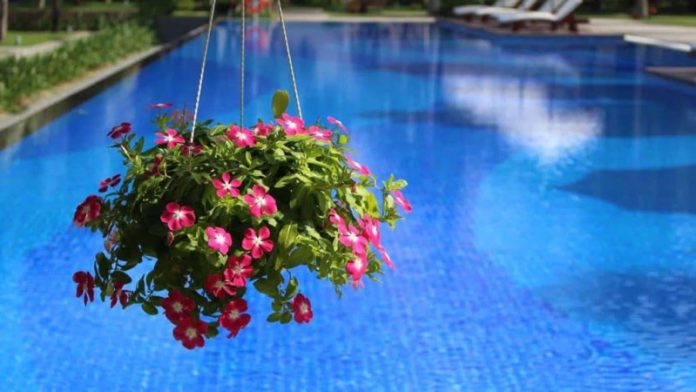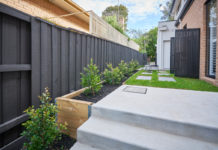If you’re a lawn enthusiast, then you may be wondering if the water in your fibreglass pool could affect your backyard landscape. This is because you’ll need to add pool chemicals to your pool water from time to time. Is there any way that these pool chemicals could damage the plants in your backyard?
The good news is that when you take the right precautionary steps, there’s nothing to worry about. Sometimes, water can splash out of your pool, such as when people splash the water around or jump into the pool, and more. But these little splashes of water won’t affect the plants surrounding your pool.
The only time your backyard landscape can be affected is when there’s a high concentration of either chlorine or salt in the water of your fibreglass pool. Learn how these can damage the plants around your pool, as well as what you can do to prevent that from happening.
Can The Water In Your Fibreglass Pool Kill Your Plants?
When there’s a greater concentration of certain chemicals in the water of your melbourne swimming pool, then this can lead to an imbalance of the pH levels. Should the soil in your backyard come into contact with such unbalanced pool water, it can be negatively affected. On the other hand, saltwater will affect the grass in your lawn, as well as plants in your backyard, differently.
When the plants in your backyard need to contend with high concentrations of salt in the water they’re absorbing, they can be affected. This saltwater can prevent them from absorbing essential nutrients as well as minerals. Now let’s look at what chlorinated and saltwater pools do to your landscape, individually.
When The Pool Water Is Chlorinated
Chlorine that is insulated can be harmful to all living things, including plants. This is because it can change the pH levels of the soil. Should the chlorine be diluted on the other hand, then it won’t affect your landscape negatively.
When water is splashed out of your fibreglass pool by people using it, this won’t affect the landscape. This is because the chlorine has been diluted in the water of the pool, as a result, it can’t affect the pH level of the soil. Should a large amount of this water splash across your yard, then this may affect your landscape.
When you’re emptying out your pool water you’ll need to ensure that the amount of chlorine in it is less than 0.1 ppm. If the amount of chlorine in the water is more, then this can kill the plants in your yard. Chlorine that’s undiluted can damage the grass, trees, as well as plants in your backyard.
When you maintain the pH level of your pool water, you ensure that your backyard plants are safe. At the same time, the water in the pool is also safe and clean to swim in.
So, does chlorine in the pool water affect your landscape? Not in its undiluted form. But if the amount of chlorine in the pool water is concentrated, then this can affect the plants in your backyard.
When You Have A Saltwater Pool
Saltwater pools are becoming more and more popular, and you could be one of the owners of a saltwater pool. Maybe you already know that salt doesn’t go well with plants, and are wondering how the water in your saltwater pool can affect your plants.
If the amount of salt in your pool water is excessive, what effect will this have on the plants in your yard? Say the plants in your backyard do get exposed to large amounts of salt. When this happens, the salt will enter the plants using tiny pores that are located in the roots. These pores are also where water and nutrients enter the plants from.
When salt enters through these pores as well, they can prevent nutrients and water from entering the plant properly. Over time, this can cause the plant to be damaged significantly.
If you have a saltwater pool, the water from the pool can sometimes splash out onto your lawn. If this happens, you should give your lawn a wash. Use fresh water to wash your lawn, to prevent the salt from being absorbed by the pores in the roots. Any salt that is deposited near the roots, will be washed away. You can also consider installing a system for drainage, where the water from your pool is taken outside. This can ensure that the saltwater from the pool is directly drained out safely, which can in turn keep the plants in your backyard landscape safe.
Should You Install A Turf Around Your Pool?
It’s becoming a trend among pool owners to install turfs around their pools. You can achieve a look for your backyard that’s softer, and your feet won’t be burnt as well, which can happen with pavers. If you do get turf installed, and have a saltwater pool, then only use high-quality salt in your pool water. This can be a little expensive, but it can keep your turf safe. Alternatively, you can install a drainage system between your pool and your turf as well.
Conclusion
You don’t have to worry about the water from your pool splashing out onto your yard, even if it happens every single day. Should you have a chlorinated pool, then the amount of damage it can cause to your landscape is very minimal. Simply maintaining the chlorine levels of your pool water, is enough to keep your plants safe.
But if you have a saltwater pool, then you’ll need to take extra precautions. Either use high-quality salt in your pool or install a drainage system to ensure that the water from the pool doesn’t splash out into your yard. Even small amounts of water splashing out can cause salt deposits to form near the roots of the plants. This can in turn prevent the plants from absorbing adequate moisture and nutrients, causing them to die.
As long as you take special precautions, irrespective of whether you have a chlorinated or saltwater pool, you can keep the plants in your backyard landscape safe.














